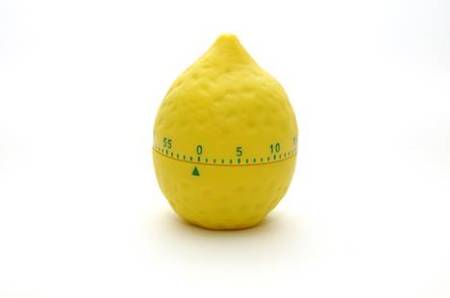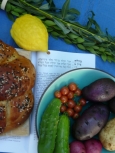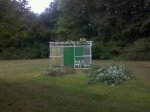Posts Tagged ‘Hebrew calendar’
Thoreau’s Sukkah at Walden Pond
April 16, 2012Last Night of Hanukkah: “These Candles”
December 8, 2010Finally, a translation of “hallalu”!
It means “these.”
In traditional Jewish practice HaNeirot Hallalu is recited immediately after lighting the Hanukkah candles. The first two words of this paragraph-long prayer — which occur twice there in the exact same form — are usually translated as “these candles.”
That second word, hallalu, is tantalizingly similar to Hebrew words meaning things like “shine brightly” and “sing praises.” However, as we discussed in my Advanced-Intermediate Hebrew class last night, the word doesn’t fit grammatically with these meanings, or with any Hebrew verb or adjective.
According to Klein: halah = m. & f. pronoun THAT. [Formed from the definite article ha… plus the deictic element …l. Compare with hallalu.] So “hallalu” is the plural pronoun, translated THESE.
Question: Why doesn’t the prayer use the more common plural demonstrative for “these,” i.e., “ha-eileh”?
Answer: I don’t know.
Still, it was extremely satisfying to find the correct translation. It was fun looking up the English word “deictic,” too.
After lighting the candles and reciting the blessings, and also after reciting HaNeirot Hallalu, it is traditional to sing songs such as Ma’oz Tzur, Mi Yimaleil, S’vivon, etc.
The Moon and the Month
October 18, 2010Look upward and see the almost-full moon. When the moon becomes completely full, you’ll know it’s the 15th of the current Jewish month. Right now we’re in the month of Heshvan.
Or, just remember that in the Jewish calendar the new moon is always the new month. In fact the Hebrew noun for “month” is HOdesh, and the Hebrew adjective for “new” is haDASH. Their shared linguistic root is perfectly obvious.
The new moon/month is always occasion for a Jewish holiday. It’s called Rosh Hodesh in Hebrew, literally “head of the month.” (Recall that Rosh haShanah means “head of the year.”)
Paradoxically, the English word “month” comes from the English word “moon,” and yet they are not (any longer) tied together. Can you look up at the sky and be able to tell that it’s October 18?
Tishrei 30: Everything You Do Matters
October 8, 2010Have you ever stopped to think that everything you do matters?
Today is the last of our 60-day spiritual journey. Today’s theme for contemplating, journal writing, and awareness, is “Everything You Do Matters.” Quoting from Rabbi Jacobson:
“In Jewish mystical thought, space, time, and matter are understood to be forces of Divine energy — sparks that fell to earth at the time of Creation, which became embedded in all aspects of existence; these sparks must be elevated in holiness for the world to achieve perfection as per the Divine plan.
This is why the little things you do in life are sometimes more important than the big things — the journey is sometimes as or more important than the final destination: going to work, people you meet on the way there, the cup of coffee you drink while waiting for the bus, the piece of paper you throw in the trash can — all are changed by your actions.”
I wish I could remember this wisdom more constantly. It’s not that I don’t believe it — it seems powerfully true. But sometimes when things are hard, or I have to make difficult choices, I forget that everything I do matters. When I’m fortunate enough to remember (or read about it!), life feels better. More complicated, perhaps, but in a good way. It really does require stopping to think about. I hope it matters that I’m posting this today.
It’s a new moon. Tishrei is over. Heshvan is beginning.* Time to move on, and try to remember: every little thing matters.
Hebrew vocabulary:
*Heshvan = a month of the Jewish calendar
mar = bitter
This new month is sometimes called Mar Heshvah, which means “bitter Heshvan,” because it has no holidays in it.
Sh’mini ‘Atzeret: Remember, remember!
September 30, 2010As if Gd is swirling around inside the sukkah, saying “Remember, remember!”
The seasonal, agrarian rhythm of the Jewish festival holidays is based on the weather and climate of the land of Israel, not New England. I know this. Nevertheless, in seven years of annual dwelling in my own sukkah, it always seems so windy on Sh’mini ‘Atzeret.
As if Gd is swirling around inside the sukkah, saying “Remember, remember!”
Because this is our challenge today: to distill all our new insight and energy into the rest of the year, now that the Tishrei holiday season is almost over. To take the spiritual shelter of the sukkah into ourselves, and remember.
Remember the soul-searching of Elul, the wake-up call of the shofar. Remember the Melting Heart of Tashlikh, remember teshuvah, the return to our Purist Selves. Remember Forgiveness. Remember Joy. Remember getting back together, with Gd and with each other.
The flimsy structure of the sukkah, with its skhakh-roof full of holes, reminded us of our vulnerability in life, that even our solid-seeming homes can’t ultimately protect us. As we read in Kohelet (the Hebrew name for the Book of Ecclesiastes), “Ha-kol havel!” Everything is vapor, vanity, futility. As if to underscore this point, the electric power is going on and off, my digital clocks are all blinking. Wake up! Pay attention! The National Weather Service has issued a Wind Advisory for the Boston area. There’s rain and thunder and a dramatic WIND.
The season is changing. The energy is shifting. Remember, remember!
More Jewish Holidays!
September 29, 2010Three more holidays in our Jewish New Year Holiday Season:
Tishrei 21, which ended at sundown tonight, was Hoshana Rabba (“the Great Hoshana”), which was the final day for waving the lulav and etrog.
Tishrei 22 began at sundown tonight, initiating the holiday of Sh’mini ‘Atzeret (“the Stopping of the Eighth,” i.e., the eighth day, and truly the end of, Sukkot), a less-famous Jewish festival. Among other observances, we say goodbye to the sukkah until next year.
Tishrei 23 is when we celebrate Simhat Torah, which means, literally, “the joy of the Torah.” We read from the very end, then rewind the scroll all the way back to the beginning and read from there.
It is truly a holiday cycle.
Hebrew grammar:
Simhat is the s’mikhut (construct) form of simhah. The noun modifies the next noun.
Simhah = joy
Simhat = joy of…
Jewish Holiday Greetings: Sukkot
September 27, 2010It is still perfectly appropriate to wish each other a Happy New Year (or Shana Tovah in Hebrew), just as people continue saying Happy (Gregorian) New Year for many weeks into January and beyond.
But maybe you’re looking for a Jewish holiday greeting more specific to the actual current Jewish holiday and wondering, What is the proper Hebrew greeting during these intermediary days of Sukkot? (September 26-29 this year) and what is the proper response?
Answer: Both come from the Festival Kiddush, as follows:
Person who initiates the greeting says: Mo’adim l’simhah!
Person who replies: Hagim u’z’manim l’sasson!
Hint about pronunciation: Each of the Hebrew words above puts the emphasis/stress on the last syllable.
Try it!
Hebrew Vocabulary:
Mo’adim = moments, “festivals,” “appointed times”
(singular: mo’eid)
l’ = for/to
simhah = joy, gladness, happy occasion
Hagim = holidays, celebrations
(singular: hag)
u’ = and
z’manim = seasons, times
(singular: z’man)
sasson = joy, happiness
Taste of Hebrew: Sukkah
September 26, 2010Tishrei 17: Quotes from Psalm 27
September 19, 2010The Book of Psalms is called T’hilim in Hebrew.
We recite Psalm 27 every day during the the first 50 days of the 60-day spiritual journey through the months of Elul and Tishrei. Starting one month before Rosh haShanah and continuing daily through Sukkot and Simhat Torah, Jews around the world repeat the comforting words of the psalmist:
“Gd is my light and my salvation; whom shall I fear?” (Ps. 27:2)
When you put it this way, our worries and problems suddenly seem smaller and less consequential, don’t you think? I guess that’s the point.
There’s a beautiful waltz tune that was composed for the Hebrew lines of the following quote, whose meaning is already beautiful. I’ve been teaching this one throughout the 60-day journey, every chance I get:
“One thing I asked of Gd, that shall I seek: That I dwell in the house of Gd all the days of my life; to behold the sweetness of Gd and to contemplate in His sanctuary.” (Ps. 27:4)
One line of Psalm 27 that always startles is the tenth verse:
“Though my father and mother have forsaken me, Gd will gather me in.” (Ps. 27:10)
Yep, that’s really what it says. Maybe they really did forsake one. Or maybe one simply grew up and moved away.
The final words of the psalm are comforting to many:
“Hope to Gd. Strengthen yourself and be encouraged, and hope to Gd.”
Tishrei 13: Sukkot Is Coming
September 17, 2010
It’s Day 43 of our 60-day spiritual journey. If you haven’t already joined in, please come aboard; it’s not too late!
Of all our happy holidays, Sukkot is the only one on which we are actually commanded, straight from the Bible, to Be Joyful. Now that we’ve been judged on how we behaved during the past year (Rosh haShanah), spent ten days trying to make it right (Ten Days of Return), and got in touch with our purist selves (Yom Kippur), it is time to party. Yes, it is!
The Jewish holiday of Sukkot always starts on a full moon, on the eve of the 15th of Tishrei. This year (5771) the holiday begins at sundown on Wednesday night, September 22.
Sukkot Basics:
1. Build a sukkah and live in it as much as possible during all seven days of the holiday. A sukkah is a hut or booth (or “tabernacle”) that we build with a deliberately flimsy structure so that it is quite subject to the weather. This small hut is built out in the open, directly beneath the sky, not under the shade or protection of other structures or trees. To make it even more vulnerable, we leave lots of holes in the roof, quite on purpose. The roofing material, or skhakh (schach), is largely what defines a kosher sukkah. The skhakh is made entirely of natural material (detached from the ground), provides shade to at least 50% of the sukkah but leaves plenty of holes through which rain can fall.
Living in a vulnerable little house reminds us that ultimately our safety and comfort and happiness all depend on Gd.
2. Every morning inside the sukkah we take up the Four Species and shake them in the six directions. These comprise the etrog (citron, pictured above), plus three kinds of branches: hadasim (myrtles), ‘aravot (willows), and lulav (palm frond). The branches are tied together in a bundle that is usually referred to as the lulav.
3. An important part of observing Sukkot is hosting guests in your sukkah. The more the merrier! In addition to our family, friends, and neighbors, we also invite the “Exalted Guests” in spiritual form, in this specific order: Abraham, Isaac, Jacob, Moses, Aaron, Joseph, and David. These guests are called ushpizin, which is Aramaic for “guests.” There’s a wonderful movie called “Ushpizin,” which I highly recommend, for learning more about Sukkot and just for pure entertainment.
4. On Sukkot we read the Biblical book of Kohelet (Ecclesiastes). Many famous quotes come from Kohelet, including “To everything there is a season,” “The sun also rises,” “There’s nothing new under the sun,” and my personal favorite: “Futility of futilities — all is futile!”
If anything in #4 above reminded you of a song, you’re well on your way to experiencing the joy of Sukkot. Singing and dancing, common expressions of joy, are a big part of celebrating this holiday.
Hebrew names for the holiday include
– HeHag (The Holiday)
– Hag haSukkot (Holiday of Booths, or “Feast of Tabernacles”)
– Z’man Simhateinu (Season of Our Joy)
‘Tis the season. No matter what’s been going on in your life lately, you must now be joyful. Sing. Dance. Find a way.
Related Articles
- Hut vs. Hut – Artists Take on the Sukkah (beliefnet.com)
- Redesigning Sukkot in New York City (boingboing.net)
- Days of Awe(some): Sukkah City Contest Brings Design Chops To Hut-Intensive Jewish Holiday (greenbuildingsnyc.com)
- www.sukkahcity.com






